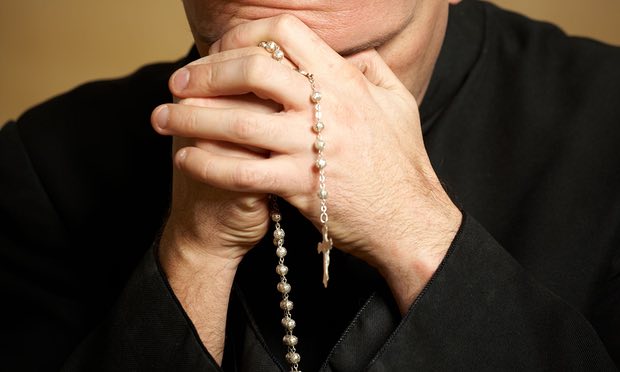Crimes of the Father by Thomas Keneally Review – a Powerful Study of Clerical Abuse
By Michael Arditti
Although Christ equivocally declared that some men “have made themselves eunuchs for the Kingdom of Heaven’s sake”, nowhere in the New Testament is celibacy enjoined on priests. St Paul, while advocating chastity as an ideal, assumed that most church leaders would be married, and St Peter, traditionally regarded as the first pope, had one of the most prominent mothers-in-law in the Bible. Priestly celibacy, which was only enshrined in law in medieval times, emerged less for spiritual than for practical reasons. The church was determined to consolidate its property and its power: in the first case, by preventing priests from leaving their possessions to their children, and in the second by controlling their most powerful human instincts. Carnal passion was denigrated as animalistic and women as the instigators of their downfall. Priests should strive to emulate the sinless, sexless Christ. Historically, clerical celibacy has been more honoured in the breach than in the observance. The most notorious offenders were the Renaissance popes, but there has been a long tradition of “the priest’s woman”, often his housekeeper. Statistics are understandably hard to obtain, but in a survey by the University of Chicago, quoted by Thomas Keneally in his new novel, 60% of Catholic priests admitted to sexual experience of one kind or another, findings that have been duplicated elsewhere. It is those who repress their sexuality until, at breaking point, they target their most vulnerable charges who wreak irreparable damage on both their victims and their church. In an authorial preface, Keneally, who as a youth trained for the priesthood, acknowledges that “the education to make me celibate … could create, encourage or license the young men whose abusive tendencies are mourned in this novel”. That awareness permeates the entire book, from its central conflict to case studies, such as that of the priest who, having abused an altar boy, declares with horrifying candour that “a man is only human”. Keneally has set this exploration of clerical abuse in his native Australia at the end of the last century, a time when the voices of victims were beginning to be heard but before they were raised in a worldwide clamour. Crimes of the Father is a provocative and powerful study of abusers and the abused. It captures the honourable priests determined to expose the outrage and the church hierarchy equally determined to discredit them. Most poignantly, it depicts ordinary Catholics caught in the crossfire, whose faith is eroded by men who, in the words of Keneally’s protagonist, Father Frank Docherty, have “been exalted above our merits”. Docherty, a Sydney priest, was sent to Canada after falling foul of the church authorities for his outspoken condemnation of the Vietnam war. While remaining in holy orders, he has worked in Canada for 30 years as a developmental psychologist. On returning home to visit his elderly mother and to lecture at a conference, he becomes embroiled in several cases of child abuse involving the influential Monsignor Leo Shannon, brother of Maureen Breslin, a parishioner with whom he had an intense but platonic love affair in the 1960s. That Keneally has striven to be comprehensive and even-handed in his approach is somewhat to the detriment of his novel. At times it reads as if it has been merely researched rather than fully imagined. There are representatives of every tendency in the clergy and laity, and both Docherty and Maureen (the only character afforded a first-person voice) are apt to generalise, he from casebook studies of abuse and she about her Irish immigrant background. The writing is most powerful when it conveys the raw pain of the victims and the twisted psyches of their abusers, including one priest who uses the confessional as a “dating agency” and another who regards his violation of a boy as an “act of beneficence”, since he has taken the adolescent’s shame upon himself. Above all, Keneally exposes the cynical casuistry of a church determined to fight critics down to “its last lawyer”, an institution that puts its survival above its soul. In the most striking phrase in the book, Docherty tells a group of survivors: “Christ be with you. He also is a sort of victim of the Church.” • Michael Arditti’s Widows and Orphans is published by Arcadia. Crimes of the Father is published by Sceptre. To order a copy for ?16.14 (RRP ?18.99) go to bookshop.theguardian.com or call 0330 333 6846. Free UK p&p over ?10, online orders only. Phone orders min p&p of ?1.99. Since you’re here … … we have a small favour to ask. More people are reading the Guardian than ever but advertising revenues across the media are falling fast. And unlike many news organisations, we haven’t put up a paywall – we want to keep our journalism as open as we can. So you can see why we need to ask for your help. The Guardian’s independent, investigative journalism takes a lot of time, money and hard work to produce. But we do it because we believe our perspective matters – because it might well be your perspective, too. I appreciate there not being a paywall: it is more democratic for the media to be available for all and not a commodity to be purchased by a few. I’m happy to make a contribution so others with less means still have access to information. Thomasine F-R. If everyone who reads our reporting, who likes it, helps to support it, our future would be much more secure.
|
.
Any original material on these pages is copyright © BishopAccountability.org 2004. Reproduce freely with attribution.
